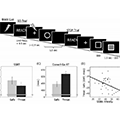Abstract
It is widely accepted that task-irrelevant threats utilize processing resources, resulting in impaired cognitive processes. However, if some subcomponents of the cognitive processes are activated by a threat, these cognitive processes may be facilitated. In the present study, we investigated whether task-irrelevant threats enhance cognitive control if the threat and task-relevant processes commonly recruit a cognitive process, inhibitory process. To examine the impact of task-irrelevant threats on inhibitory control, we had participants perform a stop-signal task with mild electric shocks. They were at risk for receiving the shocks randomly in threat blocks while no such shock was administered in safe blocks. The results showed that the stop-signal reaction time decreased under threat compared to safe conditions, indicating that inhibitory control was enhanced under threat. This beneficial effect of threat on response inhibition was more evident in participants with high state anxiety. An additional measurement of motor execution indicated that the interaction between threat and response inhibition was not derived from general arousal under threat. Results suggest that emotion and cognition do not interact simply by sharing processing resources but are related more closely to each other than we have previously thought by engaging a common processing.
